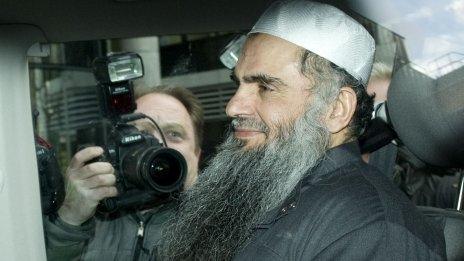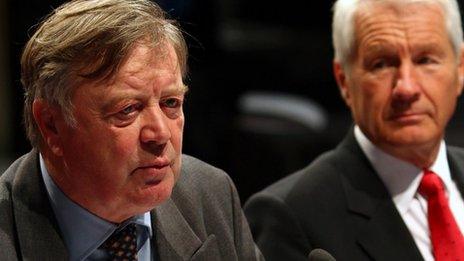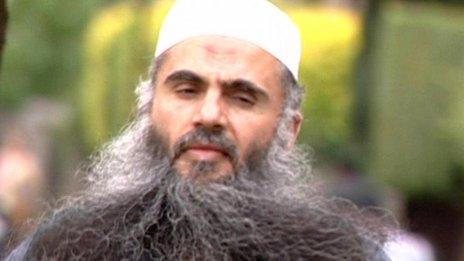Abu Qatada timeline
- Published
For almost two decades, Abu Qatada has been in the UK, resisting every effort of the government to deport him to Jordan. BBC News looks back at the long-running battle of the cleric, described as a "truly dangerous individual" and a "key UK figure" in al-Qaeda related terror activity.
16 September 1993
Jordanian national Abu Qatada, real name Omar Mahmoud Mohammed Othman, claims asylum on his arrival in Britain on a forged passport.
June 1994
The father of five is recognised as a refugee and allowed to stay in Britain.
March 1995
The "radical cleric" issues a fatwa, or religious edict, justifying the killing of converts from Islam in Algeria, and their wives and children.
May 1998
Abu Qatada applies for indefinite leave to remain in Britain.
April 1999
The cleric is convicted in his absence on terror charges in Jordan and sentenced to life imprisonment.
October 1999
Abu Qatada advocates the killing of Jews and praises attacks on Americans in a speech in London.
February 2001
Abu Qatada is questioned over his alleged connections to a German terror cell. Police find £170,000 cash in his home, including £805 in an envelope labelled "For the mujahideen in Chechnya".
December 2001
Abu Qatada becomes one of Britain's most wanted men after going on the run from his home in Acton, West London.
October 2002
The cleric is arrested at a council house in South London and detained in Belmarsh high-security prison.
March 2005
He gets conditional bail and is placed on a control order.
August 2005
Abu Qatada is arrested under immigration rules as the government seeks to deport him to Jordan.
December 2005
He makes a video appeal to the kidnappers of British peace activist Norman Kember in Iraq. The recording, made inside Full Sutton prison near York, was broadcast in the Middle East.
April 2008
The Court of Appeal rules that deporting Abu Qatada will breach his human rights, because evidence to be used against him in Jordan may have been obtained through torture.
May 2008
The immigration tribunal grants the preacher bail but orders him to stay inside for 22 hours a day.
June 2008
Abu Qatada is released from Long Lartin jail in Worcestershire and moves into a £800,000 four bedroom house in West London.
November 2008
The Muslim cleric is rearrested after the Home Office tells an immigration hearing of fears that he plans to abscond.
December 2008
Abu Qatada's bail is revoked by the Special Immigration Appeals Commission (SIAC) after hearing secret evidence that the risk of him absconding has increased.
18 February 2009
Five Law Lords, in a landmark judgement, unanimously back the government's policy of removing terror suspects from Britain on the basis of assurances from foreign governments. It is ruled that Abu Qatada can be deported to Jordan to face terror charges.
19 February 2009
The preacher is awarded 2,800 euros (£2,500) compensation by the European Court of Human Rights (ECHR) after the judges ruled that his detention without trial in the UK under anti-terrorism powers breached his human rights.
January 2012
ECHR judges rule the cleric can be sent back to Jordan with diplomatic assurances but he cannot be deported while "there remains real risk that evidence obtained by torture will be used against him".
6 February 2012
SIAC rules he can be released on bail despite posing a risk to national security.
9 February 2012
David Cameron and King Abdullah of Jordan agree on the "importance of finding an effective resolution" to this case, Downing Street says.
13 February 2012
Abu Qatada is released on bail from Long Lartin prison.
17 April 2012
He is re-arrested as the government prepares to deport him to Jordan. Home Office officials thought Abu Qatada's three-month deadline to appeal to the ECHR expired on 16 April. Home Secretary Theresa May tells MPs about fresh assurances that the radical cleric will get a fair trial.
18 April 2012
The ECHR says it has received a last-minute appeal from Abu Qatada's lawyers. They say the deadline to appeal ran out on 17 April. Mrs May disputes this.
9 May 2012
The radical cleric loses his attempt to make an appeal to the European Court of Human Rights against his deportation. The court says a panel of judges of the Grand Chamber found the appeal had arrived in time - but refused it. Home Secretary Theresa May says she is confident Abu Qatada will soon be "out of Britain for good".
28 May 2012
Abu Qatada is refused bail by the Special Immigration Appeals Commission's (Siac) president Mr Justice Mitting. He says allowing him to be on bail during heightened security at the 2012 Olympic Games would be "exceptionally problematic".
31 July 2012
He loses a further bid to be freed at the High Court.
12 November 2012
Abu Qatada wins his appeal to Siac after lawyers claim he would not get a fair trial in Jordan. Home Secretary Theresa May brands the ruling "deeply unsatisfactory". The government believes the wrong legal test was applied and is to appeal.
13 November 2012
The cleric is released from Long Lartin prison. He is subject to strict bail conditions, including only being allowed out of his house between 08:00 and 16:00, having to wear an electronic tag, and being restricted in who he meets. He is also banned from using mobile phones and computers.
5 December 2012
Home Secretary Theresa May wins permission to appeal against the decision to block the deportation.
16 December 2012
It is revealed that a legal aid bill for Abu Qatada stands at £515,778 and is rising.
25 February 2013
Abu Qatada's family win an injunction preventing protesters from demonstrating directly outside their home. His wife and five children were granted an anti-harassment order by a High Court judge in London. The judge says demonstrations can still take place but they have to be more than 500 metres from the Qatada home in London.
9 March 2013
The radical cleric is arrested by UK Border Agency officials for allegedly breaching his strict bail conditions.
11 March 2013
Home Secretary Theresa May's appeal is heard. Lawyers for Mrs May argue at the Court of Appeal that the block on deporting Abu Qatada from the UK should be lifted.
27 March 2013
Mrs May loses her appeal against the ruling preventing the deportation of Abu Qatada. Judges at the Court of Appeal rule he could face an unfair trial involving evidence obtained by torturing others if he is returned to Jordan. The Home Office says it will appeal further. Abu Qatada can now apply to be released from prison. He is being held under immigration legislation, but this can only be used if there is a realistic prospect a person is going to be deported - a prospect this ruling undermines.
23 April 2013
The Court of Appeal refuses permission for Mrs May to appeal to the Supreme Court. The government says it will now apply directly to the Supreme Court for permission.
24 April 2013
The home secretary tells MPs the government has signed a mutual assistance treaty with Jordan - complete with guarantees on fair trials - to ensure Abu Qatada can be deported. The treaty will come into play if the Supreme Court rejects the government's request.
10 May 2013
Abu Qatada's lawyer, Edward Fitzgerald QC, tells the Special Immigration Appeals Commission that his client would voluntarily return to Jordan if the Jordanian government ratifies the treaty drawn up with the UK government.
12 June 2013
Jordan's parliament approves the treaty with the UK. A week later, the country's King approves the treaty, paving the way to it becoming law.
21 June 2013
The treaty becomes law in the UK.
3 July 2013
The treaty finally becomes law in Jordan after it is officially published by the government. UK Home Secretary Theresa May resumes deportation proceedings.
- Published19 April 2012

- Published19 April 2012

- Published26 June 2014
